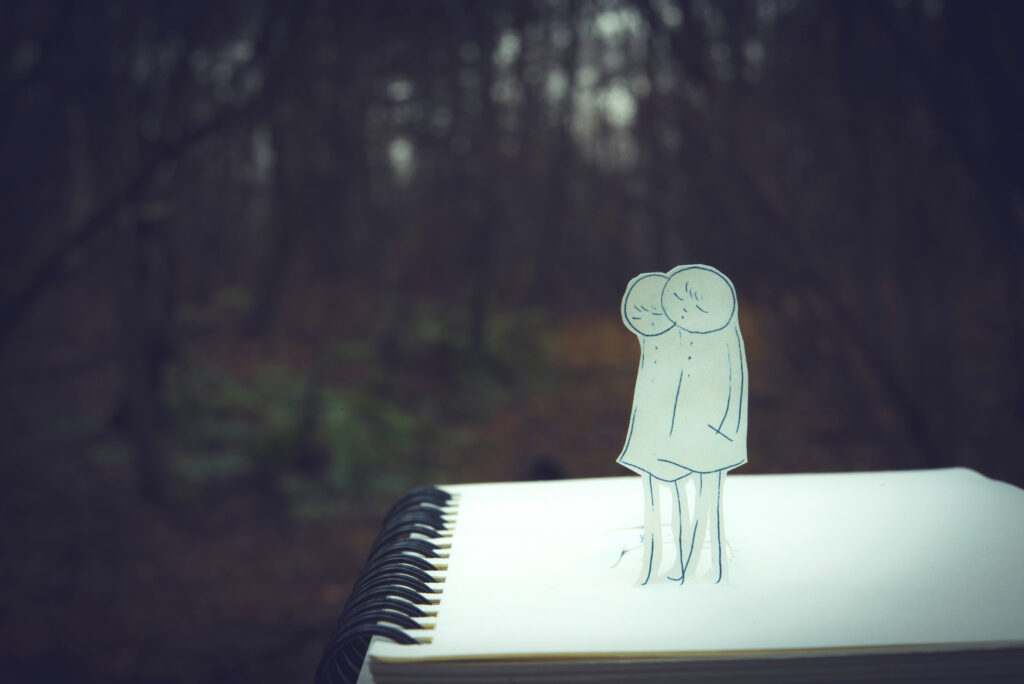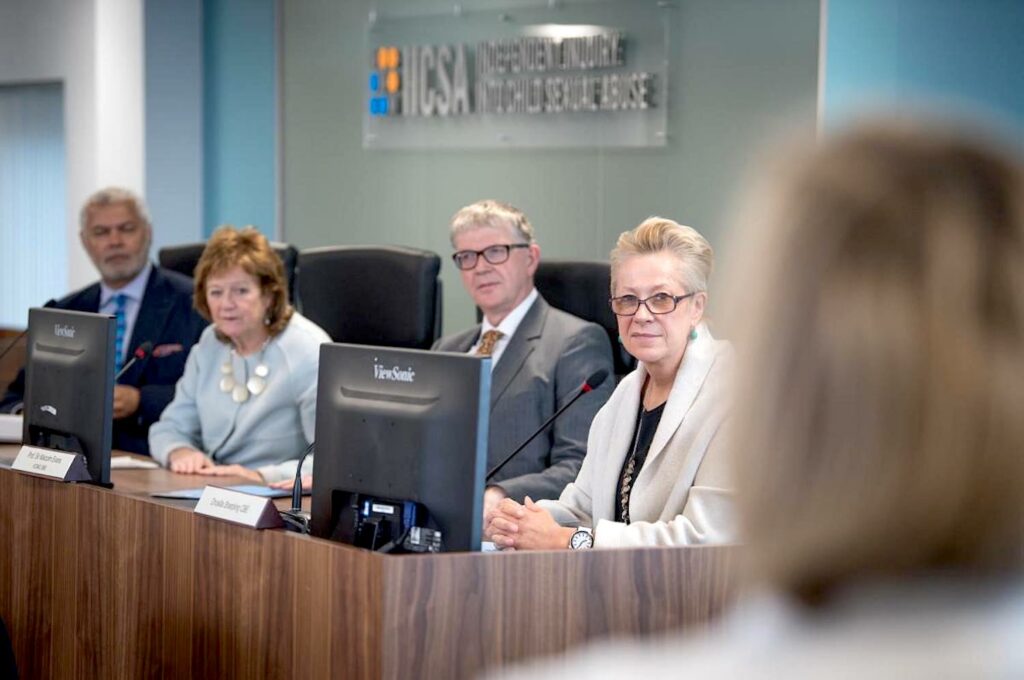Centering the Voices of Victims and Survivors of Child Sexual Abuse

“[I] just wanted to … be able to tell my story and [for] someone to listen … and not challenge me and ask me to prove it.”
—A participant in the Victim and Survivor Voices From the Truth Project
When Victoria was a child, she was taken on a day trip with her uncle and her grandparents. [1] [1] To protect their identities, all names and identifying details of victims and survivors have been changed. As her grandparents waited in the car, Victoria’s uncle, a priest, took her into a church where they prayed together. Then, he brought her into a side room and sexually abused her.
Though she did not understand what had happened at the time, Victoria felt “dirty and confused.” Years later, her memories of this abuse resurfaced when her uncle was taken to court for child sexual abuse perpetrated against another person. He was found not guilty. Victoria, feeling guilty for not having come forward sooner, began to self-harm and considered suicide.
Victoria’s story was collected as part of a series of formal investigations in England and Wales into widespread accusations of institutional abuse of children over a period of decades—one of the most extensive inquiries of its kind in the world.
Established in 2015, the Independent Inquiry into Child Sexual Abuse (IICSA or “the Inquiry”) received accounts from thousands of victims and survivors like Victoria. The findings and recommendations, presented in October to the U.K. Parliament, also incorporated 325 days of hearings and 725 witness statements. The 15 investigations looked into instances of sexual abuse across schools and organized sports, religious institutions, residential care and children’s homes, health care settings, custodial institutions, and other institutional contexts. [2] [2] Custodial institutions refer to young offenders institutions, secure training centers, and secure children’s homes for children remanded in custody or detained after sentencing, similar to juvenile detention centers in the U.S.
I am an anthropologist who worked with the IICSA research team from March 2020 to September 2021. My work included listening to recordings of victim and survivor experiences, drafting and editing reports, and completing day-to-day administrative tasks. Working with the Inquiry in this capacity was an object lesson in the ubiquity and banality of child sexual abuse. But it also revealed to me the vital importance of bringing these realities into the light and listening to the voices of victims and survivors without judgment.
It is important to state that I am not a victim and survivor of sexual abuse. Growing up in the U.K., I thought child sexual abuse was something that happened elsewhere—most often to the characters in movies or TV shows. Popular media often used sexual abuse as a plot device, a way to show a character’s moral depravity in a story. These adult perpetrators were almost always unknown to the victims. Educational messaging warning children of “stranger danger” put out by the U.K. government starting in the 1970s bolstered the idea that most threats came from unknown people.
This broader culture of denial and doubt about the pervasiveness of child sex abuse—the sense that it was something that happened elsewhere to other people—was precisely the type of social context that enabled and allowed such widespread child sexual abuse to take place for decades.
The reality is that the vast majority of child sexual abuse is perpetrated by a relative within the family home, like what happened to Victoria. The Truth Project, an initiative by IICSA to collect testimonies from victims and survivors, found that 48 percent of participants reported sexual abuse perpetrated by a family member and 70 percent of victims and survivors were girls. Participants also reported abuse from adults in institutional contexts, including schools (15 percent), religious institutions (6 percent), and residential and care homes (6 percent). Over two-thirds of participants said they did not tell anyone else about their experiences of abuse.
Thinking more systematically about how sexual abuse gets perpetrated is necessary for real social change.
Too often discussions around child sexual abuse focus on determining how best to punish the perpetrator. Should they face violence, lifelong institutionalization, or imprisonment? While the rage and desire for punishment is understandable, this emphasis often has the impact of silencing victims and survivors, who frequently report concern about the negative impacts of disclosures for their families.
While working with the IICSA, I came to see that a myopic focus on perpetrator punishment does little to prevent child sexual abuse or address the long-term needs of victims and survivors. Instead, as the #MeToo movement has demonstrated, victims and survivors often demand wider systemic redress, including destigmatizing sexual abuse and increasing public funding for victims and survivors to access appropriate therapies and social services. In other words, for real societal change to occur, we need to be engaging the more difficult questions: What do victims and survivors need socially and economically to cope and recover? How can their voices be championed?
On October 20, the IICSA published its final report and presented the results to Parliament. The report centers victims and survivors’ voices, bringing together insights from across IICSA’s investigations and research to deliver a harrowing picture of the widespread failures to protect children. It delivers 20 recommendations, such as creating child protection authorities, installing a cabinet minister for children, raising awareness through public campaigns and challenging stereotypes around child sexual abuse, and legislating mandatory reporting of sexual abuse by police officers and people who work with children in certain capacities.
From my perspective as an anthropologist, the most powerful element of the Inquiry was its commitment from the earliest stages to listening to victims and survivors with dignity and respect. The IICSA demonstrated this commitment through the Truth Project, which heard from 6,201 victims and survivors between June 2016 and October 2022. The Inquiry gained important input from the Victims and Survivors Consultative Panel, which was comprised of professionals and specialists who have experience working with victims and survivors of child sexual abuse and/or are victims and survivors themselves.
A trauma-informed approach lay at the core of the Truth Project. This ensured that participants were fully in control of giving informed consent to take part. They were provided emotional support and counseling throughout the day that they shared their experiences. And they were asked whether the experiences they shared might be included in reports, further research, and development. In the end, of the 5,440 accounts available for analysis, 10 percent shared an experience of child sexual abuse for the first time. This represents an astonishing level of courage, as well as confidence in the IICSA, on the part of victims and survivors.
Victoria’s anonymized life story was included on the platform Experiences Shared, created by the Truth Project as a testament to the power of victims and survivors to narrate their own experiences. In her story, Victoria says that finally sharing her story of child sexual abuse with a supportive friend helped her cope after thoughts of suicide. To help prevent what happened to her from happening to other children, she recommends compulsory chaperoning for children within church settings, and questioning the taken for granted role of the church as society’s moral center. She also emphasizes the importance of hearing and reporting the experiences of victims and survivors.
Another such story came from Gerard, who was placed in a state-run children’s home at around 11 years old when his mother became unable to care for him. Along with facing emotional and physical abuse from his caretakers, one staff member sexually abused Gerard in a “punishment room” in the basement of the home. He ran away and reported the abuse to authorities, but he was returned by the police and social services. He continued to be taunted by staff who told him, “Nobody loves you.”
Now an adult, Gerard suffers considerable mental health impacts and was homeless at the time of attending the Truth Project. He still feels haunted by the cruelty and punishment in the home. He decided to tell his story to the Truth Project because, he said, “I have to do my bit for other kids by doing this.”
This October conclusion of the IICSA is a time for somber and angry reflection on institutional failures to protect children like Victoria and Gerard from sexual abuse. However, it’s also an opportunity to disclose long-buried truths and injustices, and to provide timely recommendations to drive institutional reform to better protect children in the future. It is a time to learn from the significant mistakes made in the past and to center victims and survivors’ voices in taking forward lessons learned in order to improve opportunities and support.
Read more from the archives: “Difficult Truths: Confronting Irish Industrial Schools.”
Anthropologists can contribute to expanding understandings of child sexual abuse and other forms of institutional violence moving forward. Ethnography, in particular, emphasizes the importance of compassionate and engaged listening to research participants, rather than simply recording interviews. This close listening is what enables researchers to both take in the experience of the individual participant and incorporate their experiences into wider analyses of power and institutions.
This ability to think more systematically about how abuse gets perpetrated is necessary for real social change. If we continue to think of child sexual abuse as a problem that can be solved by punishing individual perpetrators, we fail to see how all members of a society may be complicit to some extent in allowing institutional abuses to continue through staying silent or looking away from painful realities.
Deeply listening to victims and survivors also means recognizing their agency. In spite of the shame and stigma attached to child sexual abuse, many victims and survivors develop means of not only surviving, but also thriving. Truth Project participants emphasized repeatedly that an important component of their coping and recovery was being heard on their own terms. Particularly since churches, schools, the police, and other institutions have repeatedly ignored or covered up sexual abuse, listening with trust and respect to those who do come forward is a powerful act toward redressing the imbalances in whose voices are believed and what credibility looks like.
One participant, a 20-year-old woman, put it this way: “It’s really only in the last few years that I’ve been able to say [to] myself, well, this isn’t about, you know, blaming mum or blaming myself. It’s about an adult, any adult almost, saying to me, ‘What happened to you shouldn’t have happened, and we take what you’re saying seriously, and we care about what you’re saying’ because that’s where the healing’s going to come about.”


































